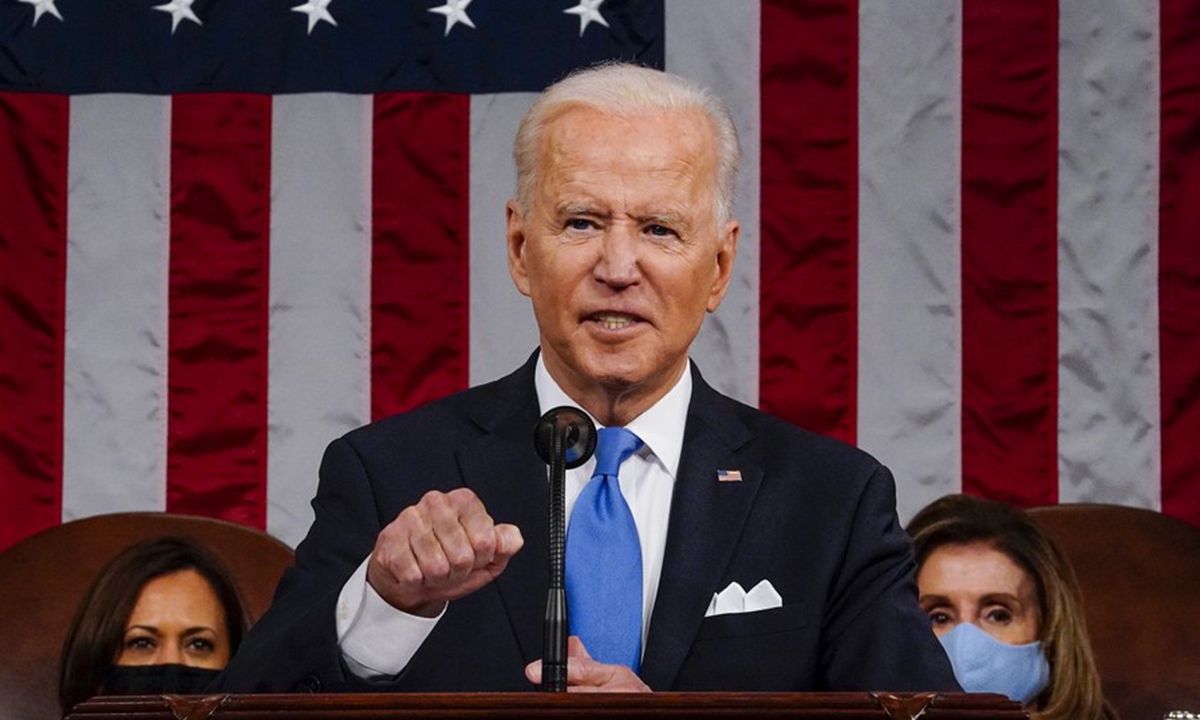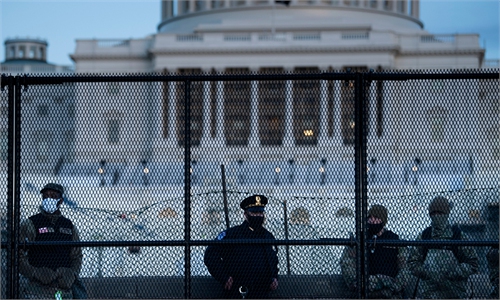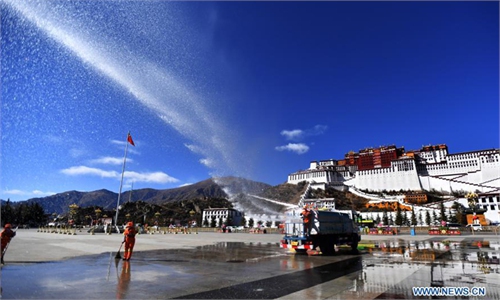
US President Joe Biden addresses a joint session of Congress in Washington, D.C. on April 28. Photo: Xinhua
US President Joe Biden's planned global summit for democracy is not in sight. Yet some US media outlets and observers are repeatedly expressing their sense of urgency of holding the event. In a recent New York Times op-ed titled, "Biden Can't Decide What Counts as a 'Democracy,'" the author laid bare the puzzle: The US itself seems not sure whether it will be a democratic summit or a semi-democratic summit to contain China and Russia. In other words, it is not decided if the summit will serve democracy or US strategic interests.
There is an age-old riddle throughout US history: Which comes first, democracy or strategic interests? However, the US has always chosen the latter in critical moments. That's why it has maintained good ties with the royal families of Saudi Arabia, Bahrain, and Kuwait.
For the US, democracy has always been a tool. At home, it serves US self-definitions and policymaking. Abroad, it is a crucial diplomatic tactic to contain and attack US rivals. Take the planned global summit for democracy. One of its purposes is to isolate China and Russia in terms of values, which is a trend to lead the world to a bipolar era.
How democratic can this planned summit actually be? It may depend on the US judgment of the sustainability of the event. If Washington can form a mechanism or even some kind of stable international organization, the first summit may start from inviting only democratic countries. But in following years, non-democratic countries may be counted in as observers. Even if non-democratic countries are invited to the first summit, they may be referred to as friends of democratic countries or dialogue partners. The US will tactfully work around to not hurt the feelings of its non-democratic allies.
After all, American democracy is confronting a series of challenges. The biggest one is the American tradition of freedom, which is the core of the US system. COVID-19 exposed how US governance is challenged by individualism. Plus, in the US democratic system, the power is decentralized. Many state governments make decisions in their own way. As a result, the country's battle against the novel coronavirus has been inefficient. Surging racism also mirrors how the US lacks adequate national governance.
China and the US have different definitions of democracy. China believes that democracy should respond to and safeguard the demands of the people. American democracy, however, cares more about the interests of elites. As the New York Times article noticed, "the new authoritarianism fashions itself not as an alternative to democracy but as a real democracy, one in which a majority governs." It adds that some in the West are "unconvinced they even still live in a democracy."
In the future, democracy will remain in multiple forms. Different models of democracy will compete with each other. This is an inevitable result of a multipolar world. The Chinese concept of democracy, for example, is already receiving attention in Asia, Africa and Latin America. Meanwhile, it should be noted that the democratic systems of Australia and New Zealand also work well in the face of the COVID-19 pandemic. So in the eyes of Western society, the decline in the influence of US democracy does not necessarily equal the failure of all Western democracies.
In terms of the choice of the suitable concept or model, China respects other countries' decisions. It will thus not force other countries to accept its model. But the US, on the other hand, is used to coercing others to follow its own style of democratic path. The move has caused quite some troubles in many countries.
What counts as a "democracy?" The answer is not supposed to be dominated by a hegemonic bully, but should instead be the result of best practices. The US will never fundamentally fix its behavior of forcibly promoting its democratic model worldwide. However, it will find it harder to continue this deed. Playing the card of democracy as a tool to contain China and Russia will not be as easy as before either. It is worth noting that democracy is only one gadget in the US tool kit and China should be vigilant against US combination blows.
The author is an associate professor at the School of International Relations, Beijing International Studies University. opinion@globaltimes.com.cn


